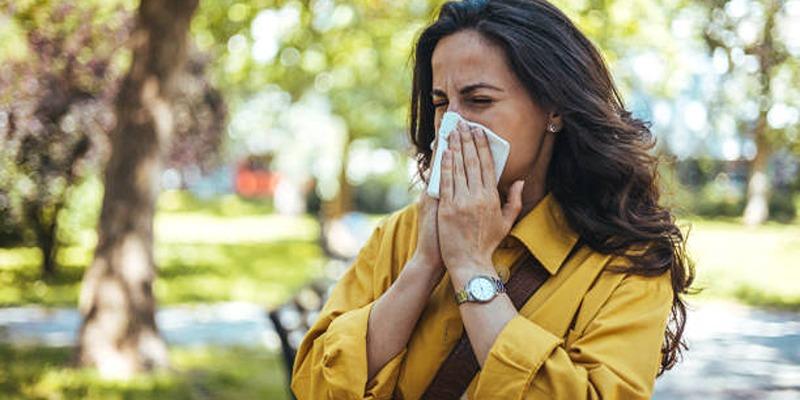Beat Allergy Season: Prevention and Relief Tips
Advertisement
The period that is known as spring, the season of appealing weather and blooming flowers. Redness of the eyes, sneezing, and stuffiness are not fun when it comes to making the most of good weather. Due to this, it is recommended that one should take his/her time and avoid rushing into a situation that could trigger the symptoms. Therefore, the following strategies can be adopted to ensure that one makes the most out of the season:
What Causes Seasonal Allergies?
 Allergies during the season cause the body to react to airborne allergens such as pollen, mold spores, and dust mites. These allergens cause symptoms such as sneezing, itchy eyes, and congestion. Though pollen from trees, grass, and weeds are the most common causes other environmental factors such as humidity and air pollution can make them worse. To be able to manage them properly, however, the first thing you need to do is find out what causes them.
Allergies during the season cause the body to react to airborne allergens such as pollen, mold spores, and dust mites. These allergens cause symptoms such as sneezing, itchy eyes, and congestion. Though pollen from trees, grass, and weeds are the most common causes other environmental factors such as humidity and air pollution can make them worse. To be able to manage them properly, however, the first thing you need to do is find out what causes them.
Common Allergy Triggers:
- Pollen: is produced by trees, grasses, and weeds in the spring, and summer although it is more prevalent in spring and fall.
- Mold Spores: are the reproductive bodies of molds that grow and can be transported through the air.
- Dust Mites: Exist in our households, in dust, mattresses, and fabrics that are covered with upholstery.
- Animal dander: It is the pet’s skin scales that are released into the environment and may lead to allergy.
Signs and Symptoms of Allergies
Allergy affects people in different ways, it starts with mild signs that are similar to the common cold. In case, they manifest at a specific period of the year, you may be having an allergy episode.
Common Symptoms
- Sneezing and runny nose: These are common reactions to allergens like pollen or dust. They occur as the body's way of expelling irritants from the nasal passages.
- Itchy or watery eyes: Allergens can irritate the membranes around the eyes, leading to symptoms like redness, itchiness, and excessive tear production.
- Nasal congestion: This happens when allergens cause swelling in the nasal passages, making it harder to breathe through the nose.
- Scratchy throat or cough: Allergens can irritate the throat, either directly or through postnasal drip, leading to discomfort and coughing.
- Fatigue due to poor sleep from congestion: Persistent nasal congestion can disrupt sleep, leaving you feeling drained and tired during the day.
- Postnasal drip leading to throat irritation: Excess mucus from the nasal passages can drip down the back of the throat, causing irritation and discomfort.
- Sinus pressure or headaches: Swollen sinus passages from allergic reactions can create pressure, leading to headaches and discomfort around the eyes, nose, or forehead.
How to Prepare for Allergy Season
Being proactive before allergy season starts can help you manage symptoms more effectively. Here are some key steps you can take:
Monitor Pollen Levels
Check daily pollen forecasts through weather apps or allergy websites. On high-pollen days, stay indoors as much as possible, especially during early morning and late afternoon when pollen counts are highest. Wearing a mask outdoors on high-pollen days can also help limit exposure.
Keep Your Home Allergy-Free
- Use HEPA Filters: High-efficiency particulate air (HEPA) filters in air purifiers and HVAC systems help trap allergens.
- Close Windows and Doors: Prevent pollen from entering your home by keeping windows closed, especially on windy days.
- Wash Bedding Frequently: Change and wash pillowcases, sheets, and blankets in hot water to remove allergens.
- Vacuum Regularly: Use a vacuum with a HEPA filter to trap dust and pet dander.
- Reduce Indoor Humidity: Using a dehumidifier can prevent mold growth.
- Keep Pets Clean: Bathing pets frequently reduces dander buildup.
Tips to Reduce Allergy Symptoms
- Shower After Being Outdoors: Washing off pollen reduces your exposure.
- Change Clothes: Wearing fresh clothes after coming inside can prevent allergens from spreading.
- Wear Sunglasses and a Hat: This helps keep pollen away from your eyes and hair.
- Use a Saline Spray: Helps clear nasal passages of allergens.
- Drink Warm Liquids: Herbal teas and warm water can soothe the throat and clear nasal congestion.
Effective Allergy Treatments
If allergies are already affecting you, there are several treatment options available to relieve symptoms.
Over-the-Counter Medications
- Antihistamines: Reduce sneezing, itching, and runny nose.
- Decongestants: Help with nasal congestion and sinus pressure.
- Nasal Sprays: Provide relief from inflammation and congestion.
- Eye Drops: Help relieve itchy, red eyes.
Natural Remedies for Allergies
If you prefer natural approaches, these options may help:
- Saline Nasal Rinse: Helps clear nasal passages of allergens.
- Steam Inhalation: Loosens mucus and clears nasal congestion.
- Honey: Some people believe local honey may help build immunity to pollen over time.
- Quercetin: Found in apples and onions, this antioxidant may reduce histamine release.
- Butterbur: A natural antihistamine alternative for some allergy sufferers.
When to See a Doctor
If allergy symptoms are severe and interfere with daily life, consult a doctor. They may recommend allergy testing or prescribe stronger medications. Allergy shots (immunotherapy) can also be an option for long-term relief. Additionally, if you experience wheezing, difficulty breathing, or chest tightness, seek medical attention immediately, as these symptoms may indicate asthma triggered by allergies.
Lifestyle Changes to Minimize Allergies
 Making small adjustments to your routine can significantly reduce your exposure to allergens.
Making small adjustments to your routine can significantly reduce your exposure to allergens.
Adjust Outdoor Activities
- Plan outdoor activities when pollen levels are lower, such as after rain.
- Avoid mowing the lawn or raking leaves, as these activities stir up allergens.
- If you must be outside, wear a mask to reduce exposure.
- Shower and wash your hair before bedtime to remove any allergens collected during the day.
Eat a Healthy Diet
Some foods contain natural anti-inflammatory properties that may help with allergies. Include these in your diet:
- Fruits and Vegetables: Rich in vitamins and antioxidants to boost immunity.
- Omega-3 Fatty Acids: Found in fish, flaxseeds, and walnuts, these help reduce inflammation.
- Probiotic Foods: Yogurt and fermented foods support a healthy immune system.
- Spices like Turmeric and Ginger: Known for their anti-inflammatory properties.
- Green Tea: Contains natural antihistamines that may help with symptoms.
Stay Hydrated
Drinking plenty of water helps thin mucus and keeps your respiratory system clear. Herbal teas with ingredients like ginger or peppermint may also provide relief from congestion. Avoid caffeine and alcohol, as they can dehydrate you and worsen symptoms.
Conclusion
Allergy season can be challenging, but with proper preparation and proactive steps, you can reduce its impact. Monitoring pollen levels, keeping your home clean, using effective treatments, and making lifestyle changes can help you breathe easier and enjoy the season. By incorporating these strategies into your daily routine, you can lessen the severity of allergy symptoms and maintain a better quality of life throughout the season.
On this page
What Causes Seasonal Allergies? Common Allergy Triggers: Signs and Symptoms of Allergies Common Symptoms How to Prepare for Allergy Season Monitor Pollen Levels Keep Your Home Allergy-Free Tips to Reduce Allergy Symptoms Effective Allergy Treatments Over-the-Counter Medications Natural Remedies for Allergies When to See a Doctor Lifestyle Changes to Minimize Allergies Adjust Outdoor Activities Eat a Healthy Diet Stay Hydrated ConclusionAdvertisement












